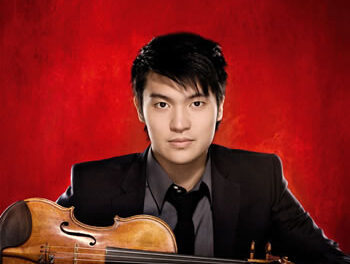August has always seemed to be the doldrums for Piedmont music lovers, though some will remember a few brief seasons relieved by the defunct Foothills Chamber Music Festival. The Carolina Chamber Symphony has stepped up to the plate with the inaugural Carolina Summer Music Festival, August 14-31, held in a series of intriguing venues across Winston-Salem. The second concert of the series, held in the intimate Babcock Hall in Reynolda House had been sold out for days in advance. The engaging program consisted of original and arranged piano works by George Gershwin, leavened by violin and piano duo transcriptions by Jascha Heifetz. The CCS musicians are drawn from free-lancers, regional orchestras, and from higher education institutions.
Reynolda House host Phil Archer briefly covered Gershwin’s biography and artistic achievements. He quoted the composer’s hint to performers “play staccato, not as legato as in European music.” He reminded concertgoers that composers such as Rachmaninoff, Schoenberg, and Stravinsky admired Gershwin’s music.
Pianist Ruskin Cooper teaches at Davidson College and is an active recitalist, chamber musician, teacher, clinician, and adjudicator both nationally and internationally. He was new to me but he really blew me away as he burned up the keyboard in some of Gershwin’s finest works. The program opened with Gershwin’s earliest success in Tin Pan Alley, “Rialto Ripples,” a rag co-written with Will Donaldson. Cooper said the 15 year-old composer had “dashed it off on a Friday night and sold it for $5 to spend on the weekend.” It featured a striding march rhythm in the left hand set against an inventive, playful melody in the right hand. This was followed by 18 hit songs, most having lyrics by Ira Gershwin, arranged for solo piano by the composer. The rich harmonies of “The Man I Love” suggested the influence of Rachmaninoff’s style. “Fascinating Rhythm” was brighter, more treble rich than I am used to hearing. “I got Rhythm” was aptly infectious. Among the intriguing lesser known songs were “Do Do Do,” “Who Cares?” and “Liza.”
Heifetz clearly ignored Gershwin’s hint, leavening his arrangements of five arias from the opera Porgy and Bess with lots of vibrato. Cooper ably supported Wake Forest University based violinist Jacqui Carrasco, one of the state’s most versatile musicians. The selections ranged from the languorous “Summertime,” the sarcastic “A Woman is a Sometime Thing” and “It Ain’t Necessarily So,” the heartbreaking “My Man’s Gone Now,” and the searing “Bess, You is My Woman Now.” Carrasco’s intonation and phrasing were immaculate.
Cooper introduced Three Preludes for Piano by drawing attention to Gershwin’s superfast recording of the works, in which he had rushed to get all on one 78 rpm disc. Cooper gave these little jewels plenty of breathing room, allowing them to blossom.
Gershwin promised Paul Whiteman a work to be premiered by the latter’s jazz band. He promptly forgot about it until he saw ads for the concert in the newspapers barely three weeks before the concert. Drawing upon his notebooks of sketches of ideas as well as inspiration, the composer managed to meet the deadline. The original version for piano and jazz band was followed by a version with orchestra, a two-piano and orchestra version, and the version selected by Cooper. In this version, Gershwin arranged elements of the solo piano part AND the orchestra parts for a solo piano. Cooper turned in a bravura performance as impressive in its overall sweep as in its detail. His breathtaking performance was rewarded by the audience leaping to a prolonged, and richly deserved standing ovation.
Carrasco joined Cooper for a consummate performance of an arrangement of Gershwin’s “The Man I Love,” the perfect choice for an encore. This entire concert deserves preservation on CD.











